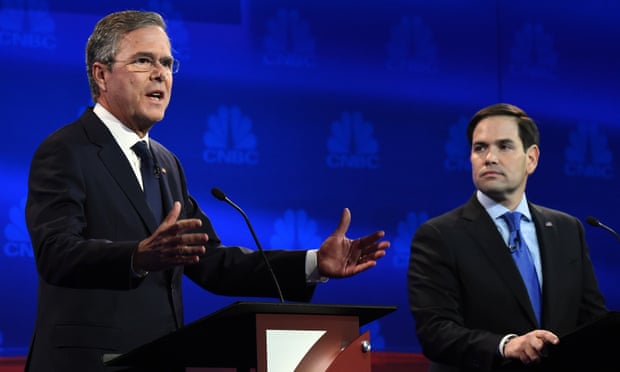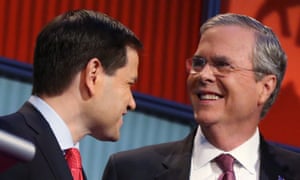Moments into the third Republican presidential debate on Wednesday, a confrontation that had been brimming for months finally unfolded before millions of TV viewers: Jeb Bush – son of president George HW, brother of president George W – turned to his former protege Marco Rubio and attacked.
While outsider candidates such as Donald Trump and Ben Carson have so far stolen the limelight in the Republican race, political pundits have long considered former Florida governor Bush and Rubio, the young senator from the same state, more formidable opponents for probable Democratic nominee Hillary Clinton and thus much more likely to face her in next November’s election.
At the debate, Bush at last seized on an opportunity to strike Rubio, attempting to make hay from his habit of missing Senate votes while campaigning for president.
“Marco, when you signed up for this, this was a six-year term, and you should be showing up to work,” said Bush. “I mean, literally, the Senate – what is it, like a French work week? You get, like, three days where you have to show up? You can campaign, or just resign and let someone else take the job.”
Bush, who is 18 years Rubio’s senior, resembled a teacher admonishing one of his pupils – but the student seemed to have become the master. Rubio deftly batted away the charge, painting Bush as hypocritical and politically motivated without actually hurling any insults at his former mentor.
“I don’t remember you ever complaining about John McCain’s vote record,” said Rubio, referring to recent comments by Bush likening himself to the 2008 Republican presidential nominee, who also missed Senate votes.
“The only reason why you’re doing it now is because we’re running for the same position,” Rubio said, as the audience began to roar, “and someone has convinced you that attacking me is going to help you. My campaign is going to be about the future of America, it’s not going to be about attacking anyone else on this stage.”
In just 60 seconds, the move the Bush campaign had been openly plotting for weeks failed in dramatic fashion and the candidate they had labelled a “GOP Obama” looked like a young and charismatic insurgent who could run away with the nomination.
For Rubio, 44, the comparisons to Barack Obama have almost become a stereotype. But although Bush’s attack was meant to highlight the senator’s relative inexperience, Rubio is happy to embrace the mantle of a fresh-faced candidate of the future who, unlike his former Florida ally, was neither born into wealth nor to a political dynasty.
Rubio has centered much of his candidacy on his personal story, invoking his humble beginnings as the son of a bartender and a maid to make an optimistic case about restoring the American dream. As the son of Cuban immigrants, he is also perceived by Republicans as well positioned to broaden their tent among Latino voters – a demographic whose distrust of the party has contributed to crushing defeats in recent presidential elections.
Rubio has used both themes to great effect from the debate stage this year, and Wednesday night in Boulder, Colorado, was no different. The senator shone in no insignificant way due to his ability to parry any perceived liability into a positive line from his stump speech.
When Bush went after his Senate attendance, Rubio reminded the audience, as he often does voters, that his campaign is designed not to take down fellow Republicans but to defeat Clinton, the Democratic presidential frontrunner. When he was questioned about his prior financial troubles while serving in the Florida state legislature, Rubio cast himself as someone who, like most Americans, has struggled with money and thus understands the impact of a sluggish economic recovery.
Rubio peppered his answers with jabs at two of conservatives’ favorite targets: Clinton and the media. Democrats have said this is what makes him so dangerous – he is relentlessly on message and knows how to sell even the most traditional of Republican policies as new and innovative.
Whether Rubio’s performance on Wednesday would dramatically lift his campaign, which has been on a slow and steady upward trajectory, remains to be seen. He received similarly glowing media attention after the first two presidential debates, but this has yet to prompt a mass exodus of establishment donors away from Bush and over to Rubio.
But increasingly anxious backers of Bush did not get the reassurances they were hoping for from the former Florida governor in Wednesday’s debate, and Rubio’s aides did not shy away from telling reporters they had received some calls from Bush donors. By Thursday, Rubio’s backers in Florida had already scheduled a fundraiser in Miami Beach with an eye on the jittery supporters of his home state rival.
A fundraising boost would help Rubio increase his presence in the early-voting states, where his campaign’s light footprint on the ground has raised questions over whether he can remain competitive in a national election.
Rubio’s aides have repeatedly sought to manage expectations and continued to do so even as the accolades poured in after the debate. “We have a long way to go and a lot of work to do,” Rubio’s spokesman, Alex Conant, said.
Arguably not as much as Bush, however, who came into the race with a war chest of nearly $100m and soaring expectations. The once-presumed frontrunner downplayed reports of his demise the day after the debate.
“I knew this would be a long journey, but to suggest that the campaign is terminal, come on. That’s pretty funny,” Bush told Fox News on Thursday.
Vowing to win the nomination “the traditional way”, he embarked on Thursday on a swing through the early-voting state of New Hampshire in the hopes of resurrecting his beleaguered campaign.
At Bush’s first event in Portsmouth, his supporters also dismissed the notion that the end of days for the former governor was near, even as they conceded they were confounded by the state of the race.
Randy and Susan Shasteen, from Key Largo, Florida, but traveling on holiday, said it was “too early to give up” and felt Bush had been too polite in his exchange with Rubio.
“Jeb was right, but Jeb’s too nice and he’s not going to hit back and say, ‘Marco, you need to do the right thing and not collect $179,000 a year and not represent the people,’” said Susan. ‘“I agree with Jeb and I cheered that.”
Privately, several of Bush’s financial backers couldn’t disagree more and were somewhat perplexed by his decision to pick a fight with Rubio, when they viewed the bombastic real-estate mogul Trump as the obstacle standing in Bush’s way to the nomination.
Frank Luntz, a Republican pollster who conducts focus groups during each debate, said the exchange allowed Rubio to benefit tremendously on a night that was “too muddy to have a clear winner”.
“He was given a gift by Jeb Bush and made the most of it,” Luntz said. “Bush jumped him. And not only did Rubio survive, he thrived.”
Bush rejected the premise that he had made a mistake and even stood by his line of attack the following day.
“If you worked at a company and decided not to show up you’d have a deduction in your pay, wouldn’t you?” he told reporters after his campaign event in New Hampshire. “I do think people ought to show up to work.”
The Bush campaign’s immediate reaction also signaled they were just getting started.
“I think Marco Rubio is an outstanding performer. We knew that going in, we know that coming out,” said Bush’s campaign manager, Danny Diaz. “The reality is that he doesn’t have a record of accomplishment. The reality is that he hasn’t demonstrated that he is qualified to be president.
“That’s the terrain where this is going to be fought. We look forward to that conversation, not just with Marco, but with other candidates.”
The collision course of the one-time allies was always inevitable and could define the coming months of a scattered and unpredictable Republican primary.
But as Bush might contemplate retooling his own strategy, Rubio sees no reason to adapt his own. During a round of media appearances the morning after the debate, the senator refused to take the bait when asked about his high-profile encounter with Bush.
“I still have tremendous admiration for him both as a person and what he did as governor of Florida and I’m not going to talk bad about Governor Bush,’’ Rubio told NBC’s Today show. “My campaign is not about him. I’m not running against him or against anyone else.”
How long Rubio can maintain the sunny demeanor that has personified his candidacy thus far is unclear. But for now, at least, his campaign appears content to rely on a simple adage: “If it ain’t broke, don’t fix it.”


0 comments:
Post a Comment